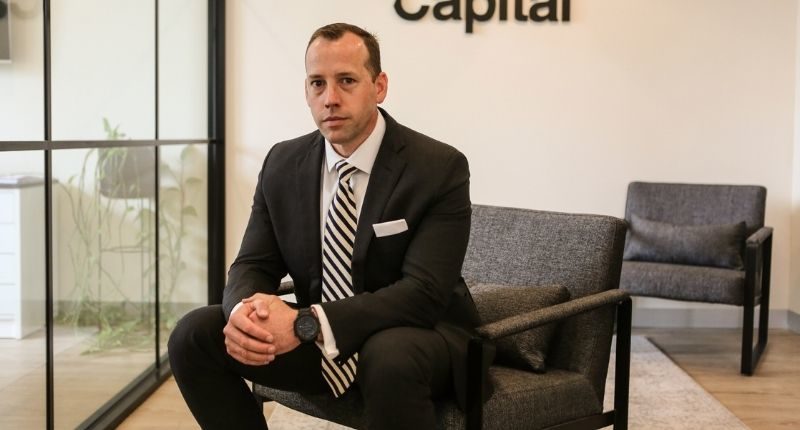
- Nick Browne, co-founder of Jameson Capital, brings a breadth of overseas experience to the boutique firm
- Post-GFC world not without its challenges, as talent shortages prove difficult
- Greatest opportunity for Jameson lies in seeking spaces unoccupied by large investors
In the latest installment of our ongoing series interviewing leaders and innovators in the real estate space, The Property Tribune spoke to Director and Co-founder of Jameson Capital Nick Browne.
Beginning his professional career as an Office Leasing Executive for Knight Frank in 2004, Mr Browne quickly made his way up in the property world.
By 2006, Mr Browne had joined Macquarie Group where he worked his way through a variety of roles and divisions, holding several senior roles within Macquarie Bank in Hong Kong.
Seeing opportunity in the Australian market, Mr Browne established Jameson Capital in 2015 with business partner Jonathan Webster, an independent funds management firm which specialises in alternative assets, with a focus on Australian real estate and private equity.
Rewriting the Australian investment story
With a breadth of experience in the property and funds management industry within Hong Kong and Chinese jurisdictions, Mr Browne is well versed in managing high value investment portfolios.
It was during his time at Macquarie, while managing a Chinese portfolio which included retail malls and a logistics fund, that Mr Browne spotted an opening in the market back on more familiar shores.
An Australian native working overseas, Mr Browne was often asked by investors about his knowledge of the Australian market and the spaces in which he recognised opportunity.
His observation of such keen interest in Australia from foreign investors lead to the creation of Jameson Capital, a firm specialising in the marketing of Australian real estate funds to offshore investors.
Despite spending a large portion of his career in Hong Kong, Mr Browne said there were few differences between the two influential nations that he perceived upon his return to the Australian market.
He noted the similarities between the investment process and the typical types of investor groups in both markets.
“What they’re looking for in terms of geographic exposure to a variety of different assets is always somewhat similar,” he said.
“When talking about investing into an emerging market like China, versus an established market like Australia it is slightly different, but the process is similar. It’s the story behind it that changes.”
Challenges of a post-GFC era
Like most industries have experienced in this tumultuous time, establishing and managing a private equity firm has not come without its challenges.
For Jameson Capital, the largest barrier to growth has come in the form of hiring new talents amid a national workforce shortage.
“The biggest challenge at the moment is finding staff and getting access to good talent,” explained Mr Browne.
“10 or 15 years ago a lot of the investment banks or private equity funds used to have a relatively large presence here in Australia. They used to have well-founded and well-funded intern programs and be able to identify people that had worked across a variety of asset classes and had a pretty broad spectrum of experience.”
After the global financial crisis in 2008 however, the presence of investment banks in Australia was impacted significantly, shaping the rise of the next generation of funds managers.
“We haven’t found that that’s the case over the last 5 or 10 years, post GFC, so hiring staff has been a major problem.”
As a result, finding new talent with a versatile background across varied asset types has become increasingly difficult.
“I think people come out of university and come straight into a very specific role and they find themselves quite siloed 5 or 10 years later. They may be 30 years old but have only worked one particular area or sector.
“That is pretty challenging to take someone who has only worked in one area for 10 years and have them start to look at different things,” he said.
In an effort to overcome hiring challenges and expand Jameson Capital’s reach, Mr Browne explained many of the firm’s latest talent acquisitions hail from Asia.
“The majority of the recent hires we have made have come from overseas, hiring people from Singapore or Hong Kong and bringing them back to Australia.
“Given the breadth of opportunity in countries like Singapore and Hong Kong, people tend to specialise far less and maintain an open mind to a variety of different areas, which just suits the way that we invest,” added Mr Browne.
Finding opportunities in separating from the herd
As for Jameson Capital’s vision for the future, Mr Browne says the firm sees the greatest opportunities in the spaces not already occupied or pursued by the large investors.
“A lot of large investors, namely superfunds here do think in a very similar fashion which means they are all chasing very similar opportunities,” he said.
“This means the returns on those sorts of opportunities tends to diminish because everyone floods into the one space and overcrowds it to a certain extent.”
Since the firm’s inception, Jameson Capital have curated a reputation as a boutique funds manager, focusing on unique investment opportunities that are often overlooked by large firms.
“They’re not really the types of opportunities that we tend to focus on,” said Mr Browne, of the investment spaces already saturated by primary corporations.
“The biggest opportunity is differentiating ourselves from that herd, and focusing on a small subset of a broader opportunity set,” he concluded.







